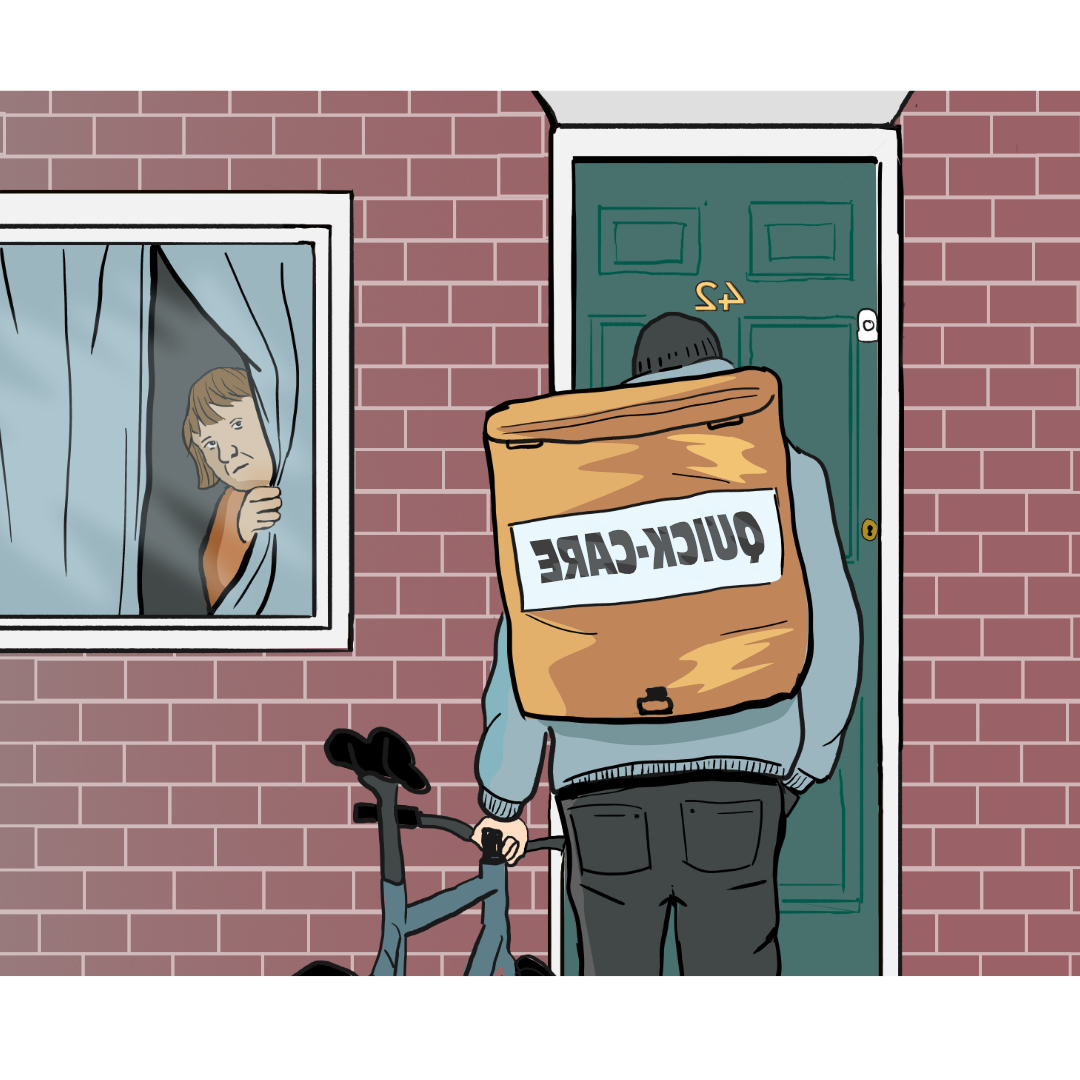
对于我们大多数在网上订购东西的人来说,这种场景现在很熟悉. You need something - a gift, 一份外卖——你在屏幕上点击选项,然后到达你的选择,点击订购. Then, 过了一段时间,一个人带着(希望是)你点的东西来到你家.
Casting your mind back to the last time you did the above, do you remember much about the person who delivered to your door? Would you remember their face in a crowd? Did you catch their name or learn anything about their background?
For most of us, 对上述问题的自然回答是“不”, of course not!这些交易被认为是客观的、短暂的、彼此完全隔绝的. 与在你家门口留下一个盒子的人保持熟悉的关系可能是件好事, it’s not an expectation of either side of the exchange.
现在想象一下,被点的“东西”不是一顿饭,也不是一件物品,而是你的照顾. 但这甚至不是你下达的命令:在一个你从未听说过的组织里,你从未见过的人,被要求对你的需求进行要点分析, and has ‘packaged up’ some of those needs (getting in/out of bed, going to the loo, 洗衣服),然后命令他们雇佣的人“递送”特定的护理“包裹”.
大多数人都希望与上门的人保持熟悉的关系,以这样一种私人的方式支持他们. In fact, 我们大多数人都希望我们对那个人是谁有某种发言权, 并且相信我们可以在一段时间内与那个人建立信任关系. However this is not the case for many people experiencing care.
越来越多的情况是,护理人员被分配的护理任务就像在Deliveroo工作的人一样:可能会考虑到他们的位置, but based primarily on their availability, 工作人员将被分配一个打包的护理任务,并被要求在特定的时间段内完成任务, with other tasks ready for them when that slot has elapsed. They will have little control over the matter, 不会试图介绍或决定是否可以建立关系, 也不会考虑这个人可能已经存在的更广泛的支持网络.
如果这听起来像是用一种奇怪的非个人的方式来传达如此私人的东西, then that’s because it is. 它不仅将寻求护理的个人视为与他们所属的社区或网络隔离开来, but the care worker is treated as a tool - a solution to a problem.
What effects does this have? 也许以这种方式组织护理的最大隐性成本是,它没有考虑到护理作为一种关系的重要性. Fundamentally, most of us have an experience of caring or being cared for. In small ways that we are normally unaware of, 我们每个人在日常生活中所做或所说的事情都可以被认为是关心的行为. A conversation about how our week has been. A meal cooked for someone. All of these are acts of care.
While some of us will practise random acts of kindness to strangers, 通常情况下,这些行为取决于我们与他人的关系. How well we know somebody, what we share agreement over, 我们的共同利益是什么:所有这些因素以及更多因素都可以决定我们在给予或接受护理时感到舒适.
没有这种关系,没有这种尊重和理解,关心就变得没有人情味. Acts of care are reduced to a few details printed on a sheet of paper. The outline of what is needed is there, but nothing is ‘coloured in’. 与你所照顾的人或接受照顾的人几乎没有关系可能意味着错过了许多可以带来真正生活质量的元素.
Sometimes, this can be the difference between life and death. A care worker who knows you well will notice if things are awry or amiss. 败血症的早期症状可能被误认为是痴呆合并感冒的症状. 如果你被诊断为痴呆和糖尿病,不知道你的人不会意识到你的低血压或高血压症状,直到你已经走得很远了. Trusted relationships save lives.
正是基于这个重要的事实,平等关怀关注的是照顾者和被照顾者之间的关系. 我们允许护理关系的双方选择:这是一个共同的决定,对支持说“是”. For workers, this means the opportunity to build lasting, 履行照顾关系,而不是被要求每天在许多不同的人之间奔波. 那些寻求关心或支持的人可以了解工人的利益, skills and experience before agreeing to the match.
通过与参与护理关系的每个人理解和建立信任, 我们可以超越个人的护理需求,否则这些需求可能会被其他护理提供者“逐项列出”,并变成一个交易——一个需要解决的问题, a thing to deliver - and instead recognise care as personal again. 它是通过给照顾者和被照顾者创造持久的机会, respectful relationships that they are in control of, 我们可以慢慢地消除delivero式的护理服务,并优先考虑生活质量需求.








